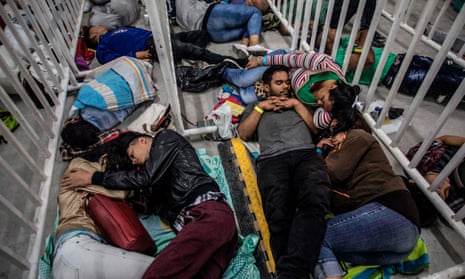Nearly two million people have fled Venezuela’s economic and political crisis since 2015, according to the UN which called for a “non-political” response to an exodus that is straining regional resources.
“Some 5,000 people are now leaving Venezuela daily – the largest population movement in Latin America’s recent history,” UN refugee agency (UNHCR) chief Filippo Grandi told the organisation’s executive committee on Monday.
“A non-political and humanitarian approach is essential to help states receiving them in growing numbers,” he added.
UNHCR spokesman William Spindler told AFP that 1.9 million people had left the country since 2015, an increase on a previous count of 1.6 milion.
According to the UNHCR, 2.6 million Venezuelans are now living abroad.
Quick GuideWhy is Venezuela in crisis?
Show
Under the late Hugo Chávez, who ushered in Venezuela’s socialist revolution in 1999, a new constitution and numerous elections placed nearly all government institutions under the control of the ruling Socialist party.
This concentration of power was aided by a feuding opposition which carried out ineffectual campaigns and electoral boycotts. After Chávez died of cancer in 2013, he was succeeded by Nicolás Maduro who is even less tolerant of dissent.
Growing political authoritarianism has coincided with greater state dominance over the economy. But expropriations, price controls and mismanagement have led to a 40% contraction of the economy in the past five years.
Oil accounts for 96% of Venezuela’s export income but many foreign companies have been driven out and production has dropped to a 30-year low.
The resulting fiscal crisis has prompted the government to print more money, which has led to hyperinflation and a collapse of the currency.
It also means that the government can’t import enough food and medicine to meet demand.
Maduro has rejected economic reforms out of loyalty to socialism and because many government officials are allegedly getting rich off the economic distortions – through exchange rate scams and by selling scarce food on the black market.
Colombia, which has taken in more than a million Venezuelans, called last week for a regional response, saying the migrant crisis was costing it about 0.5% of GDP – around $1.5m.
Grandi applauded Latin American countries for keeping their borders open, but said the regional response needed more “coherence”. But the countries concerned also needed more support, he conceded.
Oil income-dependent Venezuela’s economic woes began in 2014 with the crash in the price of crude.
Venezuelan president Nicolás Maduro’s government has since been slapped with a range of sanctions over its crackdown on the opposition and civil society critics.
